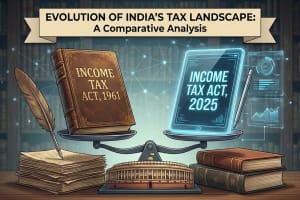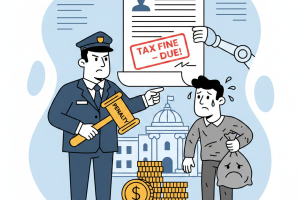All about speculation business income and income tax on speculation business

This article explains how Speculative Business is Distinct Business, What is speculative transaction, What shall not deemed to be speculative transactions, What is Eligible Transaction for security derivative, Recognised stock exchange for Section 43(5), Recognised association for Section 43(5), What are the Eligible Transaction for Commodity derivative, Do Single transaction constitute speculative business, Treatment of Losses in Speculation business and other related Income Tax Provisions.
Article further explains Which one of these are Speculative Transaction- F&O in Shares, F&O in Commodities, Intraday Trading, Normal Trading in Shares / Delivery Base, Forward Contract in Currency, Arbitrage trading and Dabba Trading.
|
Speculative Business is Distinct Business |
Explanation 2 to Section 28 of the Income-tax Act, 1961 (“Act”) provides – Where speculative transactions carried on by an assessee are of such a nature as to constitute a business, the business (hereinafter referred to as “speculation business”) shall be deemed to be distinct and separate from any other business. |
|
Why Distinct Business? |
Explanation 2 to section 28 specifically provides that where an assessee carries on speculative business, that business of the assessee must be deemed as distinct and separate from any other business. This becomes necessary because section 73 provides that losses in speculation business unlike other business, cannot be set-off against the profits of any business other than a speculation business. Likewise, a loss in speculation business carried forward to a subsequent year can be set-off only against the profit and gains of any speculative business in the subsequent year. Profits and losses resulting from speculative transaction must, therefore, be treated as separate and distinct from other profits and gains of business and profession. |
|
What is speculative transaction |
“speculative transaction” means a transaction in which a contract for the purchase or sale of any commodity, including stocks and shares, is periodically or ultimately settled otherwise than by the actual delivery or transfer of the commodity or scrips. Section 43(5) |
|
What shall not deemed to be speculative transactions |
As per Section 43(5):
a. a contract in respect of raw materials or merchandise entered into by a person in the course of his manufacturing or merchanting business to guard against loss through future price fluctuations in respect of his contracts for actual delivery of goods manufactured by him or merchandise sold by him b. a contract in respect of stocks and shares entered into by a dealer or investor therein to guard against loss in his holdings of stocks and shares through price fluctuations c. a contract entered into by a member of a forward market or a stock exchange in the course of any transaction in the nature of jobbing or arbitrage to guard against loss which may arise in the ordinary course of his business as such member d. an eligible transaction in respect of trading in derivatives referred to in clause (ac) of section 2 of the Securities Contracts (Regulation) Act, 1956 (42 of 1956) – [Security Derivative Transaction] carried out in a recognised stock exchange e. an eligible transaction in respect of trading in commodity derivatives carried out in a recognised association, which is chargeable to commodities transaction tax under Chapter VII of the Finance Act, 2013 (17 of 2013) |
|
What is Eligible Transaction for security derivative |
“eligible transaction” means any transaction –
a. Carried out electronically on screen-based systems through a stock broker or sub-broker or such other intermediary registered under section 12 of the Securities and Exchange Board of India Act, 1992 (15 of 1992) in accordance with the provisions of the Securities Contracts (Regulation) Act, 1956 (42 of 1956) or the Securities and Exchange Board of India Act, 1992 (15 of 1992) or the Depositories Act, 1996 (22 of 1996) and the rules, regulations or bye-laws made or directions issued under those Acts or by banks or mutual funds on a recognised stock exchange; and b. which is supported by a time stamped contract note issued by such stock broker or sub-broker or such other intermediary to every client indicating in the contract note the unique client identity number allotted under any Act referred to in sub-clause (A) and permanent account number allotted under this Act; |
|
Recognised stock exchange |
– NSE – BSE |
|
What is Eligible Transaction for Commodity derivative |
“eligible transaction” means any transaction,— a. carried out electronically on screen-based systems through member or an intermediary, registered under the bye-laws, rules and regulations of the recognised association for trading in commodity derivative in accordance with the provisions of the Forward Contracts (Regulation) Act, 1952 (74 of 1952) and the rules, regulations or bye-laws made or directions issued under that Act on a recognised association; and b. which is supported by a time stamped contract note issued by such member or intermediary to every client indicating in the contract note, the unique client identity number allotted under the Act, rules, regulations or bye-laws referred to in sub-clause (A), unique trade number and permanent account number allotted under this Act; |
|
Recognised association |
– MCX Stock Exchange Ltd. – United Stock Exchange of India Limited |
|
A single transaction cannot constitute speculative business |
The explanation 2 to Section 28 provides for the speculation business as separate and distinct business while Section 43(5) defines what is speculative transaction. From the reading of these two sections it is quite clear that unless the speculative transactions constitute business, the provisions of Section 73 cannot apply. Thus, unless the loss pertains to speculative business the provisions of section 73 cannot be applied. The use of the plural Speculative ‘transactions’ in explanation 2 to Section 28 clearly shows that in order to constitute speculative business within the terms of the explanation, a single transaction would not be sufficient, unless there is a systematic or organised course of activity or conduct on the part of the assessee, a single transaction cannot constitute business. Further where a transaction is settled, otherwise than by actual delivery, the transaction would be a speculative transaction. But merely because it is a speculative transaction it will not by itself render it a speculative business for which there should be more than one speculative transactions carried out by the assessee as per explanation 2 to Section 28 of the Income Tax Act, 1961.
Moreover, High court of Bombay in the case of Commissioner of Income tax vs. Kamani Tubes Ltd. 207 itr 0298, (1994) 75 Taxman 0055 followed the Supreme Court ruling in the case of Commissioner of Income tax vs. Shantilal P. Ltd. (1983) 144 itr 0057 and held that; “It is abundantly clear that failure to accept the goods in terms of the contract on the stipulated date amounts to a breach of contract and in such a case, the other party is entitled to receive compensation for loss or damage caused by such breach. In the case of a contract for the sale of goods, the measure of damages upon a breach by the buyer is the difference between the contract price and the market price at the date of the breach. Such payment cannot be termed as “payment made on periodical or ultimate settlement of the contract for purchase and sale of the commodity otherwise than by actual delivery or transfer of the commodity” contemplated by s. 43(5) of IT Act. That would happen only in cases falling under s. 63 of the Contract Act. This is a case of breach of contract and the payments made by the assessee are by way of damages caused thereby. It clearly falls in illustration (c) of s. 73. It is not a case of performance of the contract within the meaning of s. 63 of Contract Act. The payment by the assessee, therefore, cannot be termed as a “speculative transaction” within the meaning of s. 43(5). Even if in a given case, a particular transaction is held to be a speculative transaction within the meaning of s. 43(5) such a finding would not resolve the controversy regarding the applicability of Expln. 2 to s. 28 and s. 73 without a further finding that the assessee carried on business in such speculative transactions. It is only where the speculative transactions carried on by an assessee are of such a nature as to constitute business that Expln. 2 to s. 28 gets attracted and such business, which is referred to as “speculative business”, is deemed to be distinct and separate from other business and s. 73 becomes applicable to the set off and carry forward of loss from such business. There is a perceptible difference between “speculative transaction” and “speculation business”. An isolated transaction of settlement of a contract otherwise than by actual delivery of the goods might amount to “speculative transaction” within the meaning of s. 43(5) but in the absence of something more to show that the nature of the transactions was such as to constitute a business, it cannot be termed as “speculation business” which has been treated as distinct and separate from other business. |
|
Treatment of Losses in Speculation business
Section 73 of the Act |
(1) Any loss, computed in respect of a speculation business carried on by the assessee, shall not be set off except against profits and gains, if any, of another speculation business.
(2) Where for any assessment year any loss computed in respect of a speculation business has not been wholly set off under sub-section (1), so much of the loss as is not so set off or the whole loss where the assessee had no income from any other speculation business, shall, subject to the other provisions of this Chapter, be carried forward to the following assessment year, and— (i) it shall be set off against the profits and gains, if any, of any speculation business carried on by him assessable for that assessment year; and (ii) if the loss cannot be wholly so set off, the amount of loss not so set off shall be carried forward to the following assessment year and so on. (3) In respect of allowance on account of depreciation or capital expenditure on scientific research, the provisions of sub-section (2) of section 72 shall apply in relation to speculation business as they apply in relation to any other business. (4) No loss shall be carried forward under this section for more than four assessment years immediately succeeding the assessment year for which the loss was first computed. Explanation.—Where any part of the business of a company (other than a company whose gross total income consists mainly of income which is chargeable under the heads “Interest on securities”, “Income from house property“, “Capital gains” and “Income from other sources”, or a company the principal business of which is the business of trading in shares or banking or the granting of loans and advances) consists in the purchase and sale of shares of other companies, such company shall, for the purposes of this section, be deemed to be carrying on a speculation business to the extent to which the business consists of the purchase and sale of such shares. |
|
Conclusions; |
|
|
F&O in Shares |
Not a speculative business if transaction of F&O is eligible transaction, as discussed above and carried out in Recognised Stock Exchange |
|
F&O in Commodities |
Not a speculative business if transaction of F&O is eligible transaction, as discussed above and carried out in Recognised Association |
|
Intraday Trading |
As there is no delivery of shares, it will be always treated as speculative business irrespective of fact whether carried on recognised stock exchange or off market |
|
Normal Trading in Shares / Delivery Base |
Normal Business, either taxed under the head of Capital Gain or PGBP depends upon intention of holding and nature of business |
|
Forward Contract in Currency |
Not a speculative transaction If contract in respect of raw materials or merchandise entered into by a person in the course of his manufacturing or merchanting business to guard against loss through future price fluctuations in respect of his contracts for actual delivery of goods manufactured by him or merchandise sold by him |
|
Arbitrage trading |
Arbitrage trading involves simultaneously buying and selling the same asset across two different markets, profiting from the price difference. Hence, technically delivery is taken, therefore it is normal business and not a speculative transaction |
|
Dabba Trading |
Speculative transaction – However this kind of business is illegal and prohibited by SEBI |
[Article Originally published on Taxguru: https://taxguru.in/income-tax/speculative-business-speculative-transactions.html]











